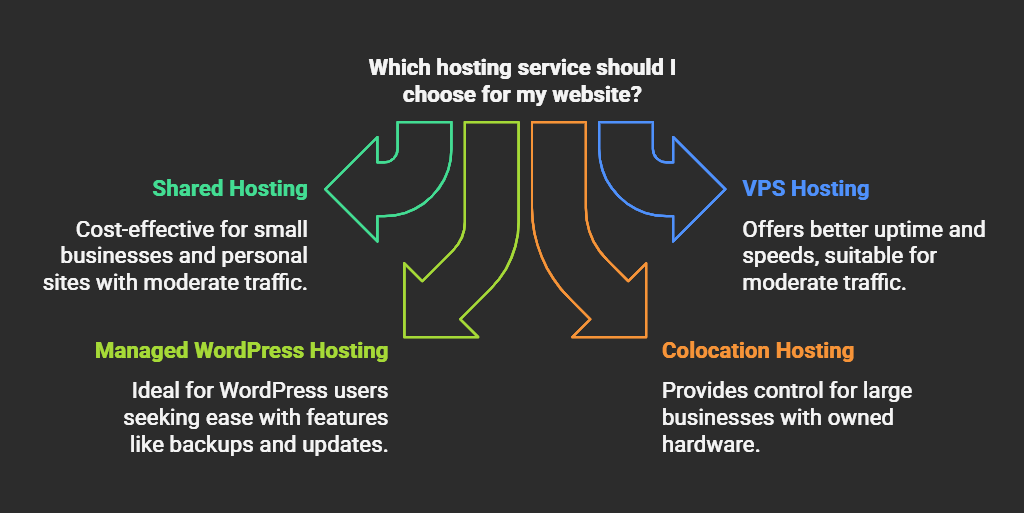What is Website Hosting and How Does it Work?
Website hosting lets us share our online world with everyone. It’s like renting a spot on a server to store our website’s files. Web hosting providers keep our sites running 24/7, so visitors can easily find them1.
At its heart, hosting makes our websites visible and always available. By choosing a hosting provider, we get the tools and know-how to keep our site safe and fast1.
The hosting process links many parts together, like servers, data centers, and DNS. These work as a team to make sure our site’s content reaches our visitors quickly and reliably, no matter where they are1.
Key Takeaways
- Website hosting is a key service that lets us share our online world. It provides the needed tools and resources.
- Hosting providers manage servers, data centers, and DNS. They make sure our site’s content is delivered fast and reliably to visitors.
- There are many hosting services, like shared, dedicated, and cloud hosting. They meet the needs of all kinds of websites, from small blogs to big e-commerce sites1.
- Good hosting plans offer great value. They might include free extras like SSL certificates and content delivery networks. These improve our site’s performance and security2.
- It’s important to have advanced security and customer support from hosting providers. They should protect our sites and help with any problems quickly2.
Understanding the Basics of Web Hosting
Web hosting lets websites live on the internet. It stores website files on web servers so people can see them everywhere. These servers are in data centers that keep everything running well.
Key Components of Web Hosting
Web hosting needs things like storage space, bandwidth, and CPU power3. Shared hosting is good for small sites and blogs3. VPS hosting is for sites that need more than shared but not a whole server3.
Dedicated hosting gives a whole server to your site. It’s best for big businesses and sites with lots of visitors3.
How Web Servers Function
Web servers are like supercomputers that store and send out website files. They handle HTTP requests and send web pages to browsers. This means getting files, making dynamic content, and sending the page to the user.
The Role of Data Centers
3 Data centers have everything needed for servers to work well3. They aim for 99.9% uptime to keep your site reliable3. Bandwidth and data transfer limits help handle traffic without slowing down. Storage space is key for website files, depending on the site’s size3.
4 A2 Hosting has 24/7/365 phone support for all customers4. They promise 99.9% uptime and pay customers for downtime.
“Web hosting is the cornerstone of a successful online presence, providing the infrastructure and resources needed to make your website accessible to the world.”
Website Hosting: Essential Service for Online Presence
Having an online presence is key for businesses and individuals today. Website hosting is the base of this digital footprint. It makes websites accessible and functional. Hosting providers offer more than just storage, like email hosting and domain registration. They also provide technical support to keep websites secure and running smoothly5.
Choosing the right hosting service is important for a website’s performance. There are many options, from shared hosting that’s affordable5 to VPS and cloud hosting that are flexible and scalable5. These solutions meet the needs of both businesses and individuals6.
Big companies often choose reliable hosting providers like Ionos for their dependable uptime and cloud hosting7. Gamers and non-gamers like Hostinger for its quality, affordable plans and great uptime7. WordPress users prefer A2 Hosting and Bluehost for their specialized WordPress hosting and tools7.
Finding the right hosting provider is crucial for a website’s success. It ensures accessibility, performance, and a good user experience. These are key for a strong online presence in today’s digital world6.
“The right web hosting solution can make or break an online business. It’s essential to choose a provider that aligns with your specific needs and offers the features and support to ensure your website’s success.”
The Technical Process Behind Web Hosting
Web hosting is a complex process that ensures websites work smoothly. It involves DNS resolution, data transfer, and file management. Each step is crucial for a website to be accessible and functional online8.
Server Response and Data Transfer
When you enter a website’s URL, DNS resolves the domain name into an IP address9. The web server then sends the files to your browser. This makes the web page load quickly9.
Hosting providers improve website performance. They use powerful servers for fast page loading9.
DNS Resolution Process
The DNS process turns a domain name into an IP address. This lets your browser find and connect to the web server8. It makes it easy for visitors to access websites by typing in the domain name9.
Website File Management
Website owners manage files through a control panel provided by the hosting company8. Hosting services also handle server maintenance and security. This ensures websites run smoothly9.
| Hosting Feature | Description |
|---|---|
| Disk Space | Storage space for website files and databases |
| Bandwidth | Data transfer capacity for web pages and content |
| Email Accounts | POP3 and forwarding mail for professional emails |
| FTP Access | Secure file transfer protocol for managing website files |
The technical process of web hosting is key to delivering websites smoothly. It ensures users can easily access and interact with content9.
Different Types of Hosting Services

There are many options for hosting your website, each with its own benefits. From shared hosting to dedicated servers, there’s something for every website need10.
Shared hosting is the cheapest, as many accounts share the same server10. It’s great for small businesses and personal sites with moderate traffic. But, Virtual Private Servers (VPS) hosting offers better uptimes and speeds than shared hosting, but it can’t handle high traffic.10
For specialized hosting, managed WordPress hosting offers automatic backups, staging, and updates10. It’s perfect for WordPress users who want an easy hosting experience.
At the other end, colocation hosting is for large businesses10. You own the hardware but rent space in a data center for maintenance. It gives businesses more control over their hosting.
Elementor Hosting is a new option10. It offers managed WordPress hosting starting at $9.99/mo for the first year. It includes Google Cloud Platform, Elementor Pro, and more.
In summary, hosting types vary in cost, performance, and flexibility101112. They cater to different website needs and user preferences.
Shared Hosting vs Dedicated Hosting Solutions
Choosing between shared hosting and dedicated hosting affects your website’s performance and security. It’s important to understand the benefits and drawbacks of each. This helps you pick the right option for your website’s needs and budget.
Benefits of Shared Hosting
Shared hosting is great for small businesses and bloggers because it’s affordable13. It lets many users share one server, keeping costs low. Plus, it’s easy to set up and manage, so you can focus on creating content.
Advantages of Dedicated Servers
Dedicated hosting gives you more control and security13. You get all the server’s resources, making your website faster and more reliable. It’s perfect for sites with lots of traffic or special needs14. You also get better security since the server is just for you.
Cost Comparison and Features
Shared hosting is cheaper, with prices from $1 to $20 a month15. Dedicated hosting costs more, from $60 to $350 a month15. But, dedicated hosting offers more features like full server control and better performance and security.
| Feature | Shared Hosting | Dedicated Hosting |
|---|---|---|
| Cost | $1 – $20 per month15 | $60 – $350 per month15 |
| Server Resources | Shared among multiple users14 | Exclusive access to all resources14 |
| Security | Shared security measures15 | Enhanced security features15 |
| Scalability | Limited expansion options15 | Superior scalability15 |
| Customization | Limited customization15 | Full control and customization15 |
| Maintenance | Managed services included15 | Requires technical expertise15 |
Choosing between shared hosting and dedicated hosting depends on your website’s needs and budget. Shared hosting is good for small sites and those with limited technical skills. Dedicated hosting is better for high-traffic sites and businesses needing more control and security.
Cloud and VPS Hosting Options
Cloud hosting and VPS (Virtual Private Server) hosting are now popular choices. They offer flexibility and scalability for websites and apps. Each has its own benefits, meeting different needs.
Cloud hosting uses many servers to scale resources as needed. It’s great for handling traffic and keeping performance steady16. It’s also cost-effective and flexible16. But, it can be complex and have security risks16.
VPS hosting divides a server into virtual parts, giving each user dedicated resources. It’s good for growing sites with changing needs17. It’s cheaper than physical servers and offers more control17. Yet, it requires technical skills and can have security issues16.
Choosing between cloud hosting and VPS hosting depends on your needs16. Cloud hosting is best for sites with changing traffic and needs16. VPS hosting suits sites with steady traffic and need for control16.
The right choice between cloud hosting and VPS hosting depends on your site’s needs16. Both have benefits and should be weighed carefully16.

In summary, cloud hosting and VPS hosting are top choices for websites and apps. They offer flexibility and cost-effectiveness. Knowing their features helps you choose the best for your online presence.
Selecting the Right Hosting Provider
Choosing the right web hosting provider is key for your online success. Look for features like uptime guarantees. Over 30,000 websites get hacked daily, showing the need for reliable hosting18. A 99.9% uptime guarantee means your site is up most of the time, keeping it accessible18.
Security is also crucial. With 43% of cybercrimes targeting small businesses18, strong security is essential. Look for SSL certificates, malware scanning, and regular backups to protect your site and customers’ data.
Pricing and Plan Comparison
When looking at pricing, check if the plan can grow with your business. While shared hosting is cost-effective for small businesses19, VPS hosting offers better performance19. Compare features like bandwidth, storage, and any extra costs for backups and disaster recovery, which can be expensive19.
Security and Support Requirements
Check the hosting provider’s customer support quality. Look for easy-to-use control panels and one-click app installations, like WordPress. SSL certificates are vital for e-commerce sites, ensuring secure transactions and customer data protection19. Also, consider the provider’s reputation, scalability, and infrastructure reliability for your business’s growth.
By evaluating these key features, pricing, security, and support, you can find the best hosting provider. This will ensure your online success and a secure, scalable web presence20.
Popular Web Hosting Providers to Consider
Choosing the right host also means knowing the best providers out there. Here are some of the most trusted and widely used hosting companies today:
- Hostinger – Known for its affordable plans and excellent performance for beginners and pros alike.
- GoDaddy – Offers a wide range of services including domains and hosting with an easy-to-use interface.
- DreamHost – A reliable option with generous storage and a strong focus on privacy.
- Cloudways – Provides high-performance managed cloud hosting with flexible scaling.
- Kinsta – Premium managed WordPress hosting built on Google Cloud for speed and security.
- WP Engine – A leader in managed WordPress hosting, offering advanced tools for developers.
- SiteGround – Great support and security features, especially for WordPress users.
- HostGator – Budget-friendly with a long-standing reputation for simplicity and uptime.
- Bluehost – Recommended by WordPress.org, ideal for small to medium-sized sites.
- IONOS – Reliable European-based hosting with strong infrastructure and business tools.
Each of these providers caters to different needs, so be sure to match their strengths with your website goals.
Domain Names and Hosting Relationship
Domain names and web hosting are two key services that work together. A domain name is your website’s address. Web hosting provides the space and technology for your site to be online21.
Many hosting providers help register your domain name. They make it easy to link your domain to your hosting account. This is done through DNS management, where nameservers point your domain to the hosting server’s IP address21.
Domain names cost about $14.99 a year21. Web hosting usually costs around $7.99 a month21. Some hosts, like Bluehost, offer a free domain and big discounts on hosting. They also provide a free SSL certificate and domain privacy21. Hostinger is offering an 80% discount to readers21.
Changing domain settings lets you point to different hosting providers. You can also transfer domain names between companies21. Subdomains, like videos.wpbeginner.com, don’t need separate registration. They can be created under a domain in the domain management area21.
| Hosting Type | Description |
|---|---|
| Shared Hosting | Affordable for small businesses and low-traffic sites, with multiple sites sharing server resources22. |
| VPS Hosting | Provides dedicated resources in a shared environment, balancing performance and scalability22. |
| Dedicated Hosting | Best for large businesses and high-traffic sites, offering an entire server for one website22. |
| Cloud Hosting | Uses multiple servers for high availability and scalability, great for sites with variable traffic22. |
| Managed Hosting | Ideal for those who prefer not to handle technical hosting tasks, as the provider manages server tasks22. |
In summary, domain names and web hosting are essential for your online presence. Understanding their relationship is key to managing your website effectively21.

Conclusion
Website hosting is key for a strong online presence. It makes websites accessible on the internet, helping users find and interact with content23. The United States is a top choice for hosting due to its network, data centers, and stable business environment23.
Hosting solutions have gotten better with technology, offering more secure and scalable options24. Reliable providers ensure websites are always up, often over 99.9% uptime24. They also use Content Delivery Networks (CDN) to speed up websites, which is good for users and search engines24.
Improving website performance is also important. This includes optimizing images, minifying code, and using caching24.
Knowing about hosting types and choosing the right provider is crucial for website owners25. Today, people are always online, and companies need to make their websites easy to use25. By focusing on quality content, SEO, and improvement, websites can better connect with their audience25.
Source Links
- https://www.namecheap.com/guru-guides/what-is-web-hosting/ – A beginner’s guide to web hosting from Namecheap
- https://www.hostinger.com/tutorials/what-is-web-hosting/ – What Is Web Hosting – Web Hosting Explained for Beginners
- https://www.theedigital.com/blog/what-is-hosting – What is Web Hosting? Web Hosting Explained for Beginners
- https://www.a2hosting.com/blog/guide-to-web-hosting/ – What Is Web Hosting & How to Pick the Best Type for Your Needs
- https://modulards.com/en/web-hosting/ – Web Hosting: Essential for Your Online Presence | Modular DS
- https://www.eccu.edu/blog/technology/what-is-web-hosting/ – Everything You Need to Know About Web Hosting Services
- https://www.pcmag.com/picks/the-best-web-hosting-services – The Best Web Hosting Services for 2024
- https://www.godaddy.com/resources/skills/what-is-web-hosting – What is web hosting? Complete guide for beginners
- https://aws.amazon.com/what-is/web-hosting/ – What is Web Hosting? – Web Hosting Service Explained – AWS
- https://elementor.com/blog/types-of-web-hosting/ – 5 Types Of Website Hosting Services Explained: Elementor
- https://www.cnet.com/tech/services-and-software/types-of-web-hosting/ – Types of Web Hosting Explained and Tested
- https://www.seekahost.com/types-of-web-hosting-services/ – 8 Different Types of Web Hosting Services You Must Know
- https://www.cloudpanel.io/blog/shared-hosting-vs-dedicated-hosting/ – Shared Hosting vs. Dedicated Hosting: Which is Right for your Website?
- https://www.namecheap.com/support/knowledgebase/article.aspx/9989/2188/what-is-the-difference-between-shared-hosting-and-dedicated-server/ – What is the difference between Shared Hosting and Dedicated server – Hosting – Namecheap.com
- https://www.techradar.com/news/shared-hosting-vs-dedicated-hosting-which-plan-should-i-choose – Shared hosting vs dedicated hosting: Which plan should I choose?
- https://runcloud.io/blog/cloud-vs-vps-hosting – Cloud Hosting vs VPS Hosting – Which One Should you Choose in 2024?
- https://www.digitalocean.com/solutions/vps-hosting – VPS Hosting Plans – Starting at $4/mo | DigitalOcean
- https://deploybot.com/blog/how-to-choose-a-web-hosting-service-provider – How to Choose a Perfect Web Hosting Service Provider: 10 Expert Tips
- https://www.business.com/articles/10-tips-for-choosing-the-right-web-hosting-company/ – Choosing the Right Web Hosting Company
- https://www.shopify.com/blog/best-web-hosting-services – Best Web Hosting Services: How To Choose a Website Host (2024) – Shopify
- https://www.wpbeginner.com/beginners-guide/whats-the-difference-between-domain-name-and-web-hosting-explained/ – What’s the Difference Between Domain Name and Web Hosting
- https://www.activate.co.nz/Blog/Understanding-the-Basics-of-Website-Hosting-and-Domain-Names/ – Understanding the Basics of Website Hosting and Domain Names
- https://hobohost.com/blog/why-hosting-your-website-in-the-united-states-is-the-best-choice/ – Why hosting your website in the United States is the best choice. – HoboHost Blog – Resources for Web Management and Hosting
- https://thevalleylist.com/web-hosting-impacts-website-speed-performance/ – How Web Hosting Impacts Website Speed and Performance
- https://hostway.com/website-content-series-part-6-conclusion/ – Website Content Series Part 6: Conclusion – Hostway







